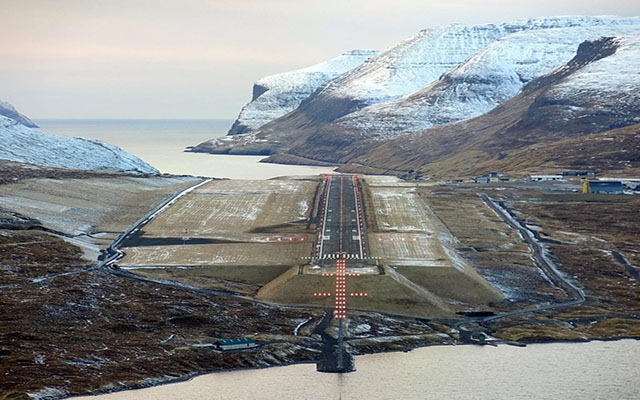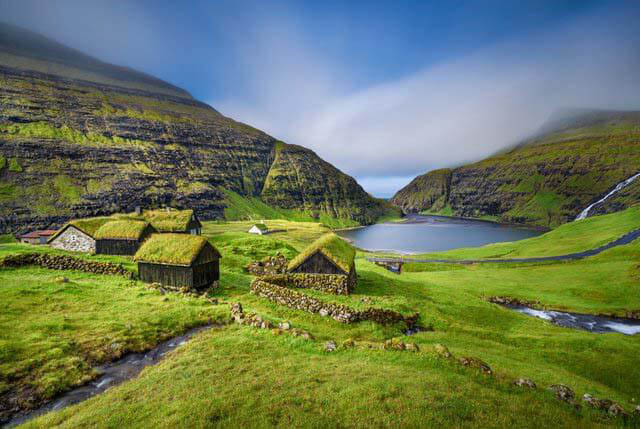There are currently 1 active airports in Faroe Islands. Below you can see the cheapest flights found in the last 6 hours.
Airports in Faroe Islands

Faroe Islands FAE
Cities in Faroe Islands (IATA)

The Faroe or Faeroe Islands ( FAIR-oh), or simply the Faroes (Faroese: Føroyar, pronounced [ˈfœɹjaɹ] ; Danish: Færøerne [ˈfeɐ̯ˌøˀɐnə]), are an archipelago in the North Atlantic Ocean and an autonomous territory of the Kingdom of Denmark. The official language of the country is Faroese, which is closely related to and partially mutually intelligible with Icelandic.
Located 320 kilometres (200 mi) north-northwest of the United Kingdom, the islands have a total area of about 1,400 square kil…
Located 320 kilometres (200 mi) north-northwest of the United Kingdom, the islands have a total area of about 1,400 square kil…
The Faroe or Faeroe Islands ( FAIR-oh), or simply the Faroes (Faroese: Føroyar, pronounced [ˈfœɹjaɹ] ; Danish: Færøerne [ˈfeɐ̯ˌøˀɐnə]), are an archipelago in the North Atlantic Ocean and an autonomous territory of the Kingdom of Denmark. The official language of the country is Faroese, which is closely related to and partially mutually intelligible with Icelandic.
Located 320 kilometres (200 mi) north-northwest of the United Kingdom, the islands have a total area of about 1,400 square kilometres (540 sq mi) with a population of 54,676 as of August 2023. The terrain is rugged, and the subpolar oceanic climate (Cfc) is windy, wet, cloudy, and cool. Despite the northerly climate, the temperatures are moderated by the Gulf Stream and average above freezing throughout the year, hovering around 12 °C (54 °F) in summer and 5 °C (41 °F) in winter. As a result of its northerly latitude and proximity to the Arctic Circle, the islands experience perpetual civil twilight during summer nights and very short winter days. The capital and largest city, Tórshavn, receives the fewest hours of sunshine of any city in the world with 840 per year.
While archaeological evidence points to earlier human habitation, Færeyinga Saga and the writings of Dicuil place initial Norse settlement in the early 9th century. As with the subsequent Settlement of Iceland, the islands were mainly settled by Norwegians and Norse-Gaels, who additionally brought thralls (i.e. slaves or serfs) of Gaelic origin. Following the introduction of Christianity by Sigmundur Brestisson, the islands came under Norwegian rule in the early 11th century. The Faroe Islands followed Norway's integration into the Kalmar Union in 1397, and came under de facto Danish rule following that union's dissolution in 1523. Following the introduction of Lutheranism in 1538, usage of Faroese was banned in churches, schools and state institutions, and thus ceased to be a written language. The islands were formally ceded to Denmark in 1814 by the Treaty of Kiel along with Greenland and Iceland.
Following the re-establishment of an official Faroese orthography by Venceslaus Ulricus Hammershaimb, the Faroese language conflict saw Danish being gradually displaced by Faroese as the language of the church, public education and law in the first half of the 20th century. The islands were occupied by the British during the Second World War, who refrained from governing Faroese internal affairs: inspired by this period of relative self-government and the declaration of Iceland as a republic in 1944, the islands held a referendum in 1946 that resulted in a narrow majority for independence. The results were annulled by Christian X, and subsequent negotiations led to the Faroe Islands being granted home rule in 1948.
While remaining part of the Kingdom of Denmark to this day, the Faroe Islands have extensive autonomy and control most areas apart from military defence, policing, justice and currency, with partial control over its foreign affairs. Because the Faroe Islands are not part of the same customs area as Denmark, they have an independent trade policy and are able to establish their own trade agreements with other states. The islands have an extensive bilateral free trade agreement with Iceland, known as the Hoyvík Agreement. In the Nordic Council, they are represented as part of the Danish delegation. In certain sports, the Faroe Islands field their own national teams. They did not become a part of the European Economic Community in 1973, instead keeping autonomy over their own fishing waters; as a result, the Faroe Islands are not a part of the European Union today. The Løgting, though suspended from 1816 to 1852, holds a claim as one of the oldest continuously-running parliaments in the world. One Faroe Islander, Niels Ryberg Finsen, has won the Nobel Prize; due to the country's small population, the Faroe Islands resultingly hold the most Nobel laureates per capita.
Located 320 kilometres (200 mi) north-northwest of the United Kingdom, the islands have a total area of about 1,400 square kilometres (540 sq mi) with a population of 54,676 as of August 2023. The terrain is rugged, and the subpolar oceanic climate (Cfc) is windy, wet, cloudy, and cool. Despite the northerly climate, the temperatures are moderated by the Gulf Stream and average above freezing throughout the year, hovering around 12 °C (54 °F) in summer and 5 °C (41 °F) in winter. As a result of its northerly latitude and proximity to the Arctic Circle, the islands experience perpetual civil twilight during summer nights and very short winter days. The capital and largest city, Tórshavn, receives the fewest hours of sunshine of any city in the world with 840 per year.
While archaeological evidence points to earlier human habitation, Færeyinga Saga and the writings of Dicuil place initial Norse settlement in the early 9th century. As with the subsequent Settlement of Iceland, the islands were mainly settled by Norwegians and Norse-Gaels, who additionally brought thralls (i.e. slaves or serfs) of Gaelic origin. Following the introduction of Christianity by Sigmundur Brestisson, the islands came under Norwegian rule in the early 11th century. The Faroe Islands followed Norway's integration into the Kalmar Union in 1397, and came under de facto Danish rule following that union's dissolution in 1523. Following the introduction of Lutheranism in 1538, usage of Faroese was banned in churches, schools and state institutions, and thus ceased to be a written language. The islands were formally ceded to Denmark in 1814 by the Treaty of Kiel along with Greenland and Iceland.
Following the re-establishment of an official Faroese orthography by Venceslaus Ulricus Hammershaimb, the Faroese language conflict saw Danish being gradually displaced by Faroese as the language of the church, public education and law in the first half of the 20th century. The islands were occupied by the British during the Second World War, who refrained from governing Faroese internal affairs: inspired by this period of relative self-government and the declaration of Iceland as a republic in 1944, the islands held a referendum in 1946 that resulted in a narrow majority for independence. The results were annulled by Christian X, and subsequent negotiations led to the Faroe Islands being granted home rule in 1948.
While remaining part of the Kingdom of Denmark to this day, the Faroe Islands have extensive autonomy and control most areas apart from military defence, policing, justice and currency, with partial control over its foreign affairs. Because the Faroe Islands are not part of the same customs area as Denmark, they have an independent trade policy and are able to establish their own trade agreements with other states. The islands have an extensive bilateral free trade agreement with Iceland, known as the Hoyvík Agreement. In the Nordic Council, they are represented as part of the Danish delegation. In certain sports, the Faroe Islands field their own national teams. They did not become a part of the European Economic Community in 1973, instead keeping autonomy over their own fishing waters; as a result, the Faroe Islands are not a part of the European Union today. The Løgting, though suspended from 1816 to 1852, holds a claim as one of the oldest continuously-running parliaments in the world. One Faroe Islander, Niels Ryberg Finsen, has won the Nobel Prize; due to the country's small population, the Faroe Islands resultingly hold the most Nobel laureates per capita.
Average prices in Faroe Islands
| White bread (500kg) | 3.75 € |
| Chicken fillets (1kg) | 12.55 € |
| Water (1,5l) | 2.90 € |
| Domestic beer (0.5l) | 3.72 € |
| Wine bottle | 10.72 € |
| Meal (1 person) | 20.11 € |
| McMeal (McDonald's) | 13.41 € |
| Domestic beer (0.5l) | 7.37 € |
| Cappuccino | 4.72 € |
| Water (0.33l) | 2.07 € |
| One-way ticket | 0.00 € |
| Taxi start | 10.05 € |
| Taxi (1h waiting) | 45.00 € |
| Gasoline (1l) | 1.63 € |
| Apartment (1 bedroom) | 685.97 € |
| Apartment (3 bedrooms) | 1,250.74 € |
| Basic (electricity, heating, water, garbage) | 121.18 € |
| Mobile phone monthly plan | 37.54 € |
| Internet (60 mbps) | 55.86 € |
| 1 m2 (outside of centre) | 1,547.08 € |
| Average Monthly Net Salary | 1,914.24 € |
| Mortgage Interest Rate | 3.10 |
The prices are calculated as average for all cities in Faroe Islands
The prices are updated from numbeo.com

Hotels | Faroe Islands
Airlines flying
to Faroe Islands



